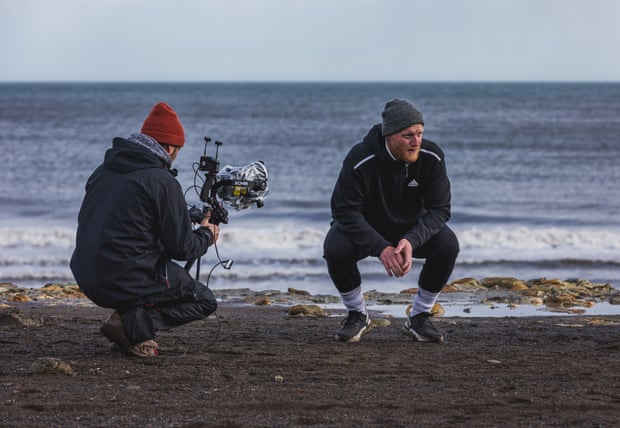Ben Stokes sits in the bathroom of a Nottingham hotel, unable to breathe. It is 6am, the morning after a match in the Hundred last year, and he is having a panic attack. It is not the first. He phones his agent, Neil Fairbrother, whose wife, Audrey, tries to calm him down. But all three know greater help is required.
It’s fair to say this was not in the script; not for Stokes, the dirt-stained warrior who 18 months earlier had almost single-handedly delivered World Cup glory at Lord’s and then felled Australia at Headingley with one of the greatest Ashes innings. And not for the makers of a documentary about the 31-year-old’s life and career, which began filming shortly after he found himself in this intensely dark place.
In an arresting early scene in Ben Stokes: Phoenix from the Ashes, which is released this week on Prime Video, a gaunt Stokes, eyes red and sunken, is seen biting his bottom lip nervously. He is two weeks into what became a four-month break from the sport and telling Sam Mendes, the renowned director and the interviewer/narrator for this project, about the spate of anxiety attacks that made him consider retiring.
The attacks were striking indiscriminately, one time in a dry cleaners when he felt his heart was “sweating” and he had to escape and another while picking up his son from a children’s party. But the most significant came after that Hundred match at Trent Bridge. Stuart Broad, his teammate and close friend, bluntly puts it: “I could have seen him never playing again.”
Twelve months later, Stokes says he is barely able to recognise himself on screen. He is in a brighter place, leading the Test team with the aggression that has underpinned his career and in an interview with the Guardian before the South Africa series, he outlines how this bleak period was overcome. Stokes began seeing a clinical psychologist and taking medication, both of which remain the case.
“I didn’t know what was happening,” he says. “The best way to explain it is, not a two-week thing but a huge buildup of multiple things over time. It’s like you’re a glass bottle, you keep putting things in there and eventually over time there’s no more room and it smashes. That’s what happened in Nottingham – the bottle smashed. But it’s hard to remember what happened, I can’t really explain it.”
Given this was a fortnight before the first interview with Mendes was due, did he not consider postponing? “It never crossed my mind. When we agreed to do the film, I told them I wanted it to be me – to be authentic. Not just make me look good. It wouldn’t be doing it justice if I said ‘I didn’t want that in there’ or we slid around things.
“I could have waited to speak about [my panic attacks] after things were better but I think what is powerful [about this film] is speaking at that low point. People who know me will think: ‘Wow. Fucking hell, that’s crazy.’”
His eventual route out? “It was a case of completely stepping away from sport. And speaking to a clinical psychologist, someone who could understand what I was feeling and tell me what my brain is doing, why it’s happening.
“But it’s not done just because I’m back playing. I still speak to the doc, not as regularly, and I’m still taking medication every day. It’s an ongoing process.”
Stokes is unsure of the specific medication – “I just take what the doctor prescribed” – but knows it is working after spending a career of dizzying highs, crushing lows and brushes with the law trying to plough through any dark spells. The message he wants to share – one that feels groundbreaking from an incumbent Test captain with a public image of being indestructible – is that seeking help is essential.
“This stuff isn’t something you pick and choose, which day you’ll feel top-drawer, which day you’ll feel like shit. The most frustrating thing, and something I understand now, is saying ‘it’ll all be alright’. No, shut up, stop being so arrogant. I was like that. I was very optimistic when I was younger, when my wife, Clare, had shit days I’d say ‘get on with it’. I never got why she was so pissed off by it.”
As the film charts in detail, the “things” that forced the “glass bottle” to smash were myriad and the match in Nottingham, when he tried to shield a finger injury and dropped a crucial catch he would usually gobble up, was the trigger. It was probably overdue, not least having failed to properly process the loss of his father, Ged, to brain cancer in late 2020; Stokes became resentful of cricket for missing his final days.

“The last time I saw Dad was leaving New Zealand to go to the Indian Premier League – that was dictated by cricket. He wanted me to go, he really loved me playing for Rajasthan Royals and the people there. But it made me hate cricket, I thought it was the reason I didn’t see my dad before he died. I should have opened up about it sooner – I just thought ‘cricket, cricket, cricket’. It’s not a regret … but I’d do things differently.”
The strains of the Covid-19 pandemic were biting and it was not the first time Stokes had started to begrudge the sport and his public profile. He had effectively been blaming himself for the Sun publishing a truly heartless story in September 2019 about his mother, Deborah, and a family tragedy that had occurred in New Zealand in the 1980s. The heartache and anger this caused is palpable.
On top of this, Stokes had also failed to make peace with the fallout from the Bristol street fight in 2017 that led to him missing that winter’s Ashes series but emerge from the resulting court case cleared of affray.
The film does not shirk the events of that night – footage of the brawl and his 2.47am arrest both feature – as Stokes maintains he was rushing to the defence of two men who were receiving homophobic abuse.
“It’s another example of, just because a situation is over, doesn’t mean it’s over,” he says. “Clare puts it really well in the film, that people would probably think I’d just move on.

“But that [not guilty verdict] was just the end of one part and the start of another. I was training the day after, playing a Test three days later, dealing with the scrutiny, dealing with my emotions. The effect it had on me and my family, on Clare … it wasn’t over.”
This was a fraught time in the public eye, the reporting of which left him feeling the media are “pieces of shit”. The disciplinary proceedings that led to his Ashes absence becoming part of a backdated ban (along with a £30,000 fine) also fuelled a strong dislike of certain “suits” at the England and Wales Cricket Board and led to him to believing he might be “playing for the wrong people”.
As the film reveals, Stokes found himself in a motorway services being talked out of quitting international cricket by Fairbrother and Clare. Given his subsequent role in the World Cup win, this was a sliding-doors moment for English cricket. Not that he has changed his view of certain administrators, one of whom was told to “fuck off” when asking for a selfie in the Lord’s pavilion after that heartstopping final.
“When I say the media are pieces of shit, it’s that they jumped to conclusions [about Bristol]. I’m not the type of person to play out a vendetta publicly – it’s my moral high ground. But there was stuff people, certain people, journalists, outlets had but chose not to put out there because it didn’t reflect the way I was being written about.
“And ‘suits’ is obviously a generic word for people at certain levels. Not everyone who wears a suit is prick. I just felt that was the best way to describe certain people without naming who they were. But if that certain person [who asked for a selfie] watches the documentary, they will know exactly who they are.”
While likely to set amateur sleuths to work, this is as far as Stokes is prepared to go. Similarly, he is tight-lipped when asked why Alex Hales, the second England player involved that night, is referred to as “my friend at the time” in the film. This is the only part of this interview where the publicist steps in to request we move on, although the obvious question about Bristol is asked: would Stokes do the same again?
“If this was a PR job to make me look good, they’d tell me to say I’d walk away,” he says. “But nah. I wouldn’t just ignore something like that. It’s not how I’ve been brought up. You see people getting shit for something they don’t deserve and they’re vulnerable – I ain’t gonna walk past it.”
This answer may jar with some but, as the documentary explores, it appears part of his makeup. His mother says it comes from his father, a tough-as-nails former rugby league international, and on a visit to Cockermouth, where Stokes grew up after reluctantly leaving New Zealand aged 12, he points out Hunter’s Alleyway, scene of countless childhood scraps. “Alright, Darra lad?” he says to a man in the street, before turning to the camera and adding: “I had a fight with him growing up.”
Cockermouth Cricket Club was part of the appeal when Ged took on a coaching role at Workington Town. It was a five-minute walk from the family’s first-floor flat and a place where their academia-averse son could burn off his boundless energy. After he showed considerable promise they began ferrying him to the academy at Durham, two hours each way, three times a week, from which his remarkable career was spawned.

The twin peaks of 2019 get the big screen treatment, with the edit of his Headingley heist particularly spine-tingling and the voiceover touchingly provided by his father. Though that innings secured his place in Ashes history, the enduring lure of the rivalry – combined with successful finger surgery – convinced him to end last year’s break sooner than he should have.
“I look back on that Ashes and accept it was too early,” says Stokes, who struggled for form and fitness during a 4-0 hammering in Australia. “I’m man enough to admit that. I let the excitement and history of the Ashes get the better of my thinking. But I’m loving life at the moment, especially out on a cricket field. Being able to influence others is something I really enjoy.”
This much is clear, with the fact that Stokes felt well enough to take on the burden of Test captaincy this year – something he has hit with typical energy – testament to the help he continues to receive. “It’s a strength to speak about stuff like this. And I am fucking tough. Just because I have spoken about it, doesn’t mean I’m not.”
Ben Stokes: Phoenix from the Ashes launches on Prime Video on Friday.
www.theguardian.com
George is Digismak’s reported cum editor with 13 years of experience in Journalism